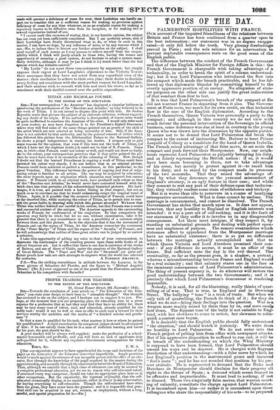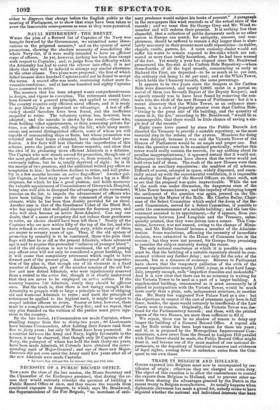TOPICS OF THE DAY.
PALMERSTON HOSTILITIES WITH FRANCE.
Onn account of the impaired friendliness of the relations between Britain and France has been confirmed from a quarter open to- the best information : our statement was in no degree exagge- rated—it only fell below the truth. Very gloomy forebodings prevail in Paris ; and the sole reliance for an intervention to- prevent deplorable consequences rests on the good sense of the
En public. The difference between the conduct of the French Government and that of the English Minister for Foreign Affairs is this : the French Government is chargeable with taking advantage of a technicality, in order to break the spirit of a solemn understand- ing; but it was Lord Palmerston who introduced the flaw into- the compact which made the breach practicable, and be has fol- lowed up that diplomatic blunder by committing himself to the overtly aggressive position of an enemy. No allegation of sinis- ter purposes on the other side can justify the great indiscretion of that conduct from first to last.
It is true that Lord Palmerston's breach of the compact at Eta did not warrant France in departing from it also. The Govern- ment at Paris rests, too much for its own credit, on that technical flaw in the case of the English diplomatist. According to the- French themselves, Queen Victoria was personally a party to the compact ; and although in this country we do not view with much favour the personal intervention of the Sovereign in official business, some deference was due at least in courtesy-to. the young Queen who was drawn into the discussion by the opposite parties. It seems not to be denied that Lord Palmerston did break the compact to the extent of instructing Mr. Bulwer to treat Prince- Leopold of Coburg as a candidate for the hand of Queen Isabella. The French seized advantage of that false move, to set aside the compact and push forward their Montpensier. Now, our neigh- bours represent Lord Palmerston as palpably betraying his duty., and as falsely representing the British nation : if so, it would have been more becoming in them, not to take advantage of his error, but merely to protest against it—to recall him to his duty, and to stand by the compact made in presence of the two monarchs. That they seized the advantage of- fered by what they denounce as the personal misconduct of England's attorney, is an ugly feature in their casa; and while they consent to rest any part of their defence upon that technica- lity, they virtually confess some stain of selfishness and trickery.
But it is worse than idle to persevere in a course of bandying retrospective accusations. What is done cannot be undone. The marriage is consummated, and cannot be dissolved. The French Government has stolen that march upon us. It does not appear, however, that any hostility to England or English interests was intended : it was a pure act of self-seeking, and it is the fault of our statesmen if they suffer it to involve us in any disagreeable consequences. Let them meet intrigue, if they suspect it, by standing on substantial grounds and dealing with. perfect open- ness and singleness of purpose. The remote eventualities which statesmen affect to apprehend from the Montpensier marriage have no substantial existence: there is as yet no difference between the marriage actually accomplished and that to which Queen Victoria and Lord Aberdeen promised their con- sent : if any difference do accrue, it must be an affair of the future. But sufficient unto the day is the evil thereof. The eventuality, so far as the present goes, is a shadow, a pretext whereas a misunderstanding between France and England would be a real calamity ; and that calamity stares one in the face as the imminent consequence of Lord Palmerston's administration. The thing of present urgency is, to do whatever- will restore the good understanding between the two Governments ; and it is precisely that which Lord Palmerston's demeanour is rendering impossible.
Nobody, it is said, for all the blustering, really thinks of quar- relling or of war. That is true, in England and in Downing Street. The bullying " tone " is a trick of trade. Bat when we only talk of quarrelling, the French do think of it ; for they do what we do not—bring their feelings into the question. War is .a weapon more readily seized by them than by us, and more easily) laid down. The flippant tone of the bully is not suitable to Eng- land, with her slowness to come to action, her slowness to relin- quish a contest once begun. It is desirable that the English public should fully understand " the situation," and should watch it jealously. We write from no hostility to Lord Palmerston. We do not enter into the French project of pelting him from office with newspaper attacks. But if his aggressive disposition be suffered to run riot, it will be in breach of the understanding on which the Whig Ministry is supposed to have been formed, that Lord Palmerston should, amend his ways and be discreet. He is charged with flagrant dereliction of that understanding—with a false move by which he lost England's position in the matrimonial game and incurred " fool's mate " ; and he has not mended that position by his pre- sent attitude. He is represented to demand that the Duke and Dutchess de Montpensier should disclaim for- their progeny all right to the throne of Spain ; a demand- which seems framed to be offensive and impracticable. It must lead to nothing, if not to discord. Those two singularly false moves, that wanton court- ing of calamity, constitute the charge against Lord Palmerston. It is incumbent upon him—or rather it is incumbent upon those oolleagues who share the responsibility of his acts—to be prepared either to disprove that charge before the English public at the
meeting of Parliament, or to show that steps have taken to avert the lamentable consequences as soon as they were perceived.



























 Previous page
Previous page